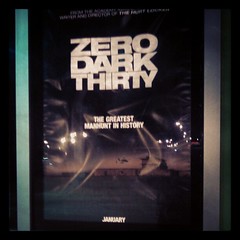Apparently some of the material in the Kathryn Bigelow film, The Hurt Locker, was rather laughable; certain bomb-disposal soldiers found it so. Certain bits and pieces in Bigelow’s Zero Dark Thirty (2012), written by Mark Boal, probably are as well, while other details are simply false, such as the intel about Osama bin Laden’s courier being acquired through waterboarding. But no matter. The politically unbiased Zero is sufficiently honest to communicate that waterboarding, form of torture though it is, can be effective. It does so without condoning or despising it, however; rather it shows it journalistically and reticently. It is this that has drawn fire from the liberal elites.
Strong and involving, this hunt-for-bin Laden docudrama is all about CIA activity, especially that of Jessica Chastain’s Maya. It tells us that a strong nation always puts up a fight against a Hitlerian enemy, even with a temporarily failing intelligence agency (which is what the CIA is here). Notice I said “temporarily.” In truth the film respects the CIA.
Regrettably, Maya is not a fully realized character and far less interesting than Carrie in the TV series Homeland. Chastain does what she can with her, though, which is a lot. Jason Clark is vivid and gripping as CIA officer Dan. The British actress Jennifer Ehle, this time with an American accent, succeeds beautifully.
I have lately seen some meaningful and significant political films: Won’t Back Down, Lincoln, Atlas Shrugged Part 2, and now Zero Dark Thirty (a military phrase, by the way, meaning 30 minutes after midnight). The more this kind of cinema irritates the liberal elites, or at least challenges their views, the better, for then we have cultural diversity of thought and sentiment. It makes for a healthier situation in the arts than we have had.




